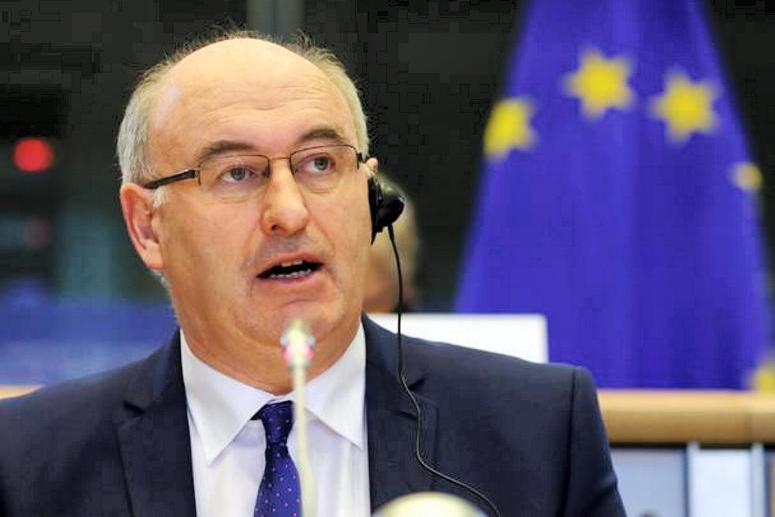Two significant Brexit events took place on either side of the Irish Sea on Monday. In Dublin, there was the IFA conference with the keynote address delivered by European Commissioner for Agriculture Phil Hogan. In London, there was a special briefing from the UK secretary of state for environment, food and rural affairs, Andrea Leadsom.
From a farming and agri-food perspective, the tone of both events would suggest that some level of common sense is starting to prevail ahead of negotiations.
In his address to over 700 Irish farmers and industry delegates, Phil Hogan repeatedly stressed that the rest of Europe recognised the unique challenges that Brexit presents for Ireland and that Brussels “understood” the Irish problem.
On the same day in London, as Matt Dempsey reports, Andrea Leadsom said she does not envisage tariffs on Irish beef coming into the UK. Instead, she spoke of an all-encompassing free trade agreement (FTA) between the UK and the EU. She also spoke positively about general Northern Ireland-Republic of Ireland issues being solved.
The potential softening in the UK’s stance towards the upcoming negotiations with the EU would align with reports that the trade ambitions of “global Britain” have received a dose of reality in recent months – mainly in the sense that potential trade partners are slow to engage in advance of having a clear view of the UK’s future relationship with the EU.
Of course, an FTA between the EU and the UK in the absence of any restrictions placed on imports from non-EU countries would do little to protect the value of the British market for Irish food exports.
However, Hogan was quick to point out that in any FTA, partners would be required to apply EU standards both domestically and on imports – a clear indication that any comprehensive FTA would effectively prevent the UK from pursuing a cheap food policy with countries such as Brazil or the US. In London, Leadsom repeated her pledge that lower standard imports would not be allowed to undercut British farmers.
Interestingly, Hogan and Minister for Agriculture Michael Creed, who also spoke at the IFA event, differed in their views as to the extent to which the decision by UK prime minister Theresa May to call a general election would affect upcoming negotiations. Minister Creed expressed concern that an increased Conservative majority, as is widely anticipated, could mean more Eurosceptics in UK government – a scenario that would likely reinforce the hardline stance. It is a view that appears to be gaining momentum.
The Brussels view was that an increased Conservative majority would give May increased scope to move back from the hardline stance adopted at the start of the year. Indeed, Hogan believes that the future participation in the customs union by the UK is a possibility.
While we should take some comfort from the views coming from Britain and Brussels, there is little room for complacency
Of course, for this to be significant in an Irish context, agriculture – which currently operates outside of the customs union – would have to be included to facilitate tariff-free trade.
While we should take some comfort from the views coming from Britain and Brussels, there is little room for complacency. The IFA and the Government have done a good job to date in ensuring Britain and Brussels understand the unique challenges facing Ireland from Brexit. But the process is only starting. The extent to which the EU truly recognises the Irish challenges should be judged on the negotiating guidelines that are to be agreed on Saturday when European leaders meet – the first solid indication as to the extent to which Brussels understands.
Unfortunately, the commissioner’s mainly upbeat assessment of Brexit ended when he was asked if the EU stood ready to intervene in the beef market should the fallout from Brexit see a collapse in Irish prices. He dismissed any notion that it was the role of the EU to react to currency volatility. His response misses the point and clearly needs to be challenged by the IFA.
As demonstrated by the response to the dairy crisis and indeed the Russian ban, the Commission clearly has a role in reacting to a potential market collapse. Why are market management tools, such as intervention, available to support dairy markets and not beef markets?
Brussels must not be allowed to wash its hands of responsibility in coping with the fallout from Brexit on innocent parties such as Ireland. While common sense may be starting to prevail, the threat to the Irish food sector remains as stark as ever.
Read more
Full coverage: Brexit
Two significant Brexit events took place on either side of the Irish Sea on Monday. In Dublin, there was the IFA conference with the keynote address delivered by European Commissioner for Agriculture Phil Hogan. In London, there was a special briefing from the UK secretary of state for environment, food and rural affairs, Andrea Leadsom.
From a farming and agri-food perspective, the tone of both events would suggest that some level of common sense is starting to prevail ahead of negotiations.
In his address to over 700 Irish farmers and industry delegates, Phil Hogan repeatedly stressed that the rest of Europe recognised the unique challenges that Brexit presents for Ireland and that Brussels “understood” the Irish problem.
On the same day in London, as Matt Dempsey reports, Andrea Leadsom said she does not envisage tariffs on Irish beef coming into the UK. Instead, she spoke of an all-encompassing free trade agreement (FTA) between the UK and the EU. She also spoke positively about general Northern Ireland-Republic of Ireland issues being solved.
The potential softening in the UK’s stance towards the upcoming negotiations with the EU would align with reports that the trade ambitions of “global Britain” have received a dose of reality in recent months – mainly in the sense that potential trade partners are slow to engage in advance of having a clear view of the UK’s future relationship with the EU.
Of course, an FTA between the EU and the UK in the absence of any restrictions placed on imports from non-EU countries would do little to protect the value of the British market for Irish food exports.
However, Hogan was quick to point out that in any FTA, partners would be required to apply EU standards both domestically and on imports – a clear indication that any comprehensive FTA would effectively prevent the UK from pursuing a cheap food policy with countries such as Brazil or the US. In London, Leadsom repeated her pledge that lower standard imports would not be allowed to undercut British farmers.
Interestingly, Hogan and Minister for Agriculture Michael Creed, who also spoke at the IFA event, differed in their views as to the extent to which the decision by UK prime minister Theresa May to call a general election would affect upcoming negotiations. Minister Creed expressed concern that an increased Conservative majority, as is widely anticipated, could mean more Eurosceptics in UK government – a scenario that would likely reinforce the hardline stance. It is a view that appears to be gaining momentum.
The Brussels view was that an increased Conservative majority would give May increased scope to move back from the hardline stance adopted at the start of the year. Indeed, Hogan believes that the future participation in the customs union by the UK is a possibility.
While we should take some comfort from the views coming from Britain and Brussels, there is little room for complacency
Of course, for this to be significant in an Irish context, agriculture – which currently operates outside of the customs union – would have to be included to facilitate tariff-free trade.
While we should take some comfort from the views coming from Britain and Brussels, there is little room for complacency. The IFA and the Government have done a good job to date in ensuring Britain and Brussels understand the unique challenges facing Ireland from Brexit. But the process is only starting. The extent to which the EU truly recognises the Irish challenges should be judged on the negotiating guidelines that are to be agreed on Saturday when European leaders meet – the first solid indication as to the extent to which Brussels understands.
Unfortunately, the commissioner’s mainly upbeat assessment of Brexit ended when he was asked if the EU stood ready to intervene in the beef market should the fallout from Brexit see a collapse in Irish prices. He dismissed any notion that it was the role of the EU to react to currency volatility. His response misses the point and clearly needs to be challenged by the IFA.
As demonstrated by the response to the dairy crisis and indeed the Russian ban, the Commission clearly has a role in reacting to a potential market collapse. Why are market management tools, such as intervention, available to support dairy markets and not beef markets?
Brussels must not be allowed to wash its hands of responsibility in coping with the fallout from Brexit on innocent parties such as Ireland. While common sense may be starting to prevail, the threat to the Irish food sector remains as stark as ever.
Read more
Full coverage: Brexit








SHARING OPTIONS